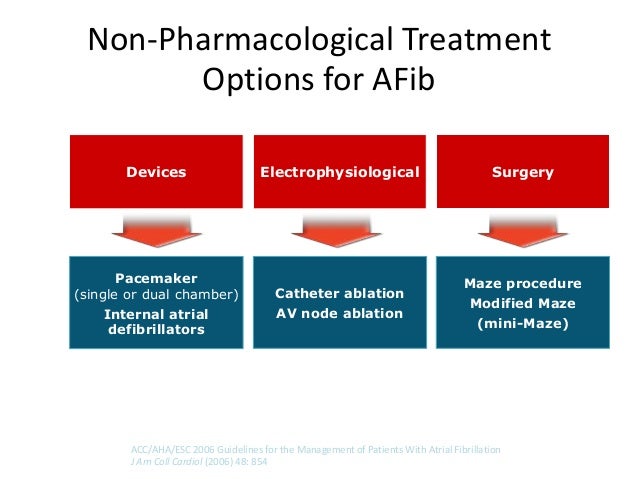In addition to knowing your goals you will want to discuss your treatment. In A Fib the conduction system is affected and therefore electronic devices such as artificial pacemakers are used to stimulate the heart and help restore the normal rhythm.
 Nonpharmacological Treatment Of Atrial Fibrillation
Nonpharmacological Treatment Of Atrial Fibrillation
For those trying to figure out how to treat afib the pacemaker provides a tried-and-true method for regulating the heart rate.
Pacemaker afib treatment. The aging of the population improvements in monitoring for more accurate detection of AF and the epidemic of obesity in developed nations have led to a much higher-than. Single-chamber pacemakers stimulate one chamber of the heart either an atrium or more often a ventricle. A pacemaker to treat sick sinus syndrome is very important.
They can be used to treat AFib other disorders. Criticism of the afib programs running on pacemakers is they dont fix afib they just treat the afib symptoms and eventually the afib sessions may get more frequent or worse. The pacemaker is implanted under the skin just below your clavicle and this procedure is done under local anesthesia or local anesthesia in the hospital.
The two most important treatments are rate control meds to keep heart rate under control like beta blockers or calcium channel blockers and anticoagulation if you have risk factors for an AF related stroke. Pacemaker with afib by Theknotguy - 2020-07-13 085137. This topic will review the.
They are especially helpful for people whose hearts beat too slowly. The cause of afib is an irregular heartbeat hence pacemakers are often used. Pacing has not been shown to prevent the development of AF.
If your doctor has recommended a pacemaker its important to. Almost 2 decades ago AF and heart failure HF were declared the two new epidemics of cardiovascular disease 1 Unfortunately factors have led to steady growth rather than abatement of these intertwined conditions. The principal reason to place a pacemaker in a patient with atrial fibrillation AF is to treat symptomatic bradycardia.
Pacemakers For AFib. Even though pacemaker insertion is considered minor surgery there are still some risks. Electrical cardioversion pulmonary vein antrum isolation procedure ablation of the AV node followed by pacemaker placement or surgical ablation Maze procedure or minimally invasive surgical treatment.
Pacemakers are implanted just under the skin of the chest during a. The Maze procedure A final treatment called the Maze procedure may be used to treat AFib. Roughly 1 in 5 people may need a small electronic device called a pacemaker to help the atrial fibrillation medication do its job.
There are two basic types of pacemakers. Pacemakers are also helpful for patients with. Generally a pacemaker has no impact on your ability to take antiarrhythmic drugs or to have a catheter ablation or surgery for afib other than allowing you to take medications that might drive your heart rate lower.
Pacemakers are a great option for many AFib patients. Pacemakers are used to treat arrhythmias which are problems with the rate or rhythm of the heartbeat. A pacemaker along with the right medications can help your heart beat at its normal pace.
The pacemaker is used to treat a slow heart rate bradycardia that happens in some people who have atrial fibrillation. When I meet with a patient to discuss with them treatment options about atrial fibrillation I get frequently asked about pacemakers and whether they can help with the management of atrial fibrillationFirst when I get this question from patients I feel that patients are assuming that the pacemaker is going to fix atrial fibrillation or cure atrial fibrillation. A pacemaker may also be used to treat fainting spells syncope congestive heart failure and hypertrophic cardiomyopathy.
In addition with an afib pacemaker you will see a reduction in. Medicines to control atrial fibrillation. When medications do not work to correct or control atrial fibrillation or when medications are not tolerated a procedure may be necessary to treat the abnormal heart rhythm such as.
If no underlying cause can be found the treatment options are. Treatment Options of Atrial Fibrillation AFib or AF The severity any other underlying medical issues you might have and the length of the AF condition will determine the best treatment options for you. The pacemaker does not treat atrial fibrillation itself.
Medicines to reduce the risk of a stroke. Yes I have AFib which was diagnosed before my pacemaker and continued after my implant too.